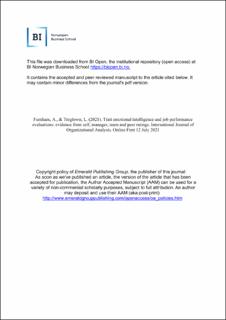Trait emotional intelligence and job performance evaluations: evidence from self, manager, team and peer ratings
Peer reviewed, Journal article
Accepted version
Permanent lenke
https://hdl.handle.net/11250/2994376Utgivelsesdato
2021Metadata
Vis full innførselSamlinger
- Scientific articles [2181]
Originalversjon
International Journal of Organizational Analysis. 2021, 29 (5), 1156-1171. Online First 12 July 2021. 10.1108/IJOA-07-2020-2316Sammendrag
Purpose – The study aims to look at whether trait emotional intelligence (EI) was related to the job performance level of a manager, their immediate team and their peers. Design/methodology/approach – This study looked at the relationship between trait EI and performance appraisals, as evaluated by the person themselves, their peers, manager and team. Trait EI facets of 903 employees were compared to evaluated performance appraisals of the different groups four months later. Findings – All 15 of the correlations (20 < r < 0.42) between the emotional intelligence facets and self-ratings were significantly positive whilst for managers 10, peers 6 and team only 4 were significant, though all were positive. In line with affective primacy theory, structural equation modelling revealed performance was rated higher by non-manager colleagues when employees exhibited traits associated with positive interpersonal interactions. Originality/value – There are very few studies using multi-source ratings to explore the consequences of EI on a manager’s team and peers

